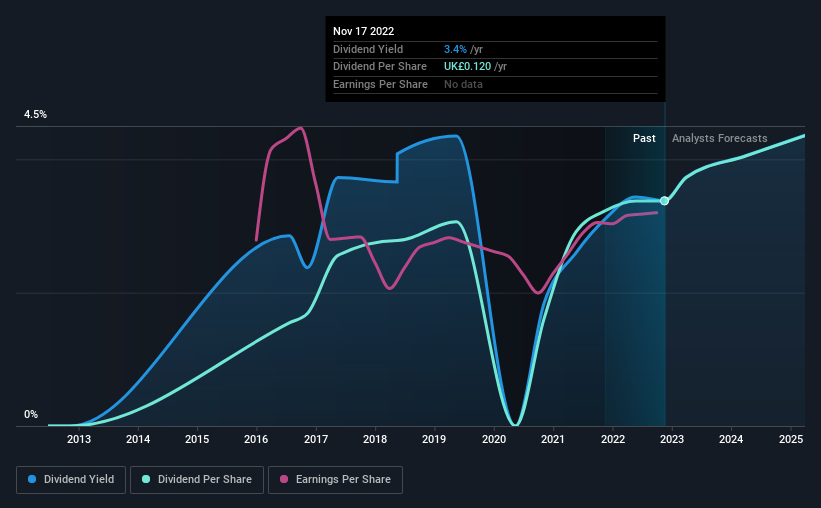
Wincanton plc (LON:WIN) has announced that it will pay a dividend of £0.044 per share on the 30th of December. This means the annual payment is 3.4% of the current stock price, which is above the average for the industry.
View our latest analysis for Wincanton
Wincanton's Earnings Easily Cover The Distributions
Impressive dividend yields are good, but this doesn't matter much if the payments can't be sustained. However, Wincanton's earnings easily cover the dividend. As a result, a large proportion of what it earned was being reinvested back into the business.
The next year is set to see EPS grow by 10.4%. If the dividend continues along recent trends, we estimate the payout ratio will be 29%, which is in the range that makes us comfortable with the sustainability of the dividend.

Wincanton's Dividend Has Lacked Consistency
It's comforting to see that Wincanton has been paying a dividend for a number of years now, however it has been cut at least once in that time. This suggests that the dividend might not be the most reliable. The annual payment during the last 6 years was £0.055 in 2016, and the most recent fiscal year payment was £0.12. This works out to be a compound annual growth rate (CAGR) of approximately 14% a year over that time. Dividends have grown rapidly over this time, but with cuts in the past we are not certain that this stock will be a reliable source of income in the future.
The Dividend's Growth Prospects Are Limited
Growing earnings per share could be a mitigating factor when considering the past fluctuations in the dividend. Earnings per share has been crawling upwards at 2.6% per year. While growth may be thin on the ground, Wincanton could always pay out a higher proportion of earnings to increase shareholder returns.
Our Thoughts On Wincanton's Dividend
In summary, we are pleased with the dividend remaining consistent, and we think there is a good chance of this continuing in the future. The payout ratio looks good, but unfortunately the company's dividend track record isn't stellar. Taking all of this into consideration, the dividend looks viable moving forward, but investors should be mindful that the company has pushed the boundaries of sustainability in the past and may do so again.
Investors generally tend to favour companies with a consistent, stable dividend policy as opposed to those operating an irregular one. At the same time, there are other factors our readers should be conscious of before pouring capital into a stock. As an example, we've identified 1 warning sign for Wincanton that you should be aware of before investing. If you are a dividend investor, you might also want to look at our curated list of high yield dividend stocks.
Valuation is complex, but we're here to simplify it.
Discover if Wincanton might be undervalued or overvalued with our detailed analysis, featuring fair value estimates, potential risks, dividends, insider trades, and its financial condition.
Access Free AnalysisHave feedback on this article? Concerned about the content? Get in touch with us directly. Alternatively, email editorial-team (at) simplywallst.com.
This article by Simply Wall St is general in nature. We provide commentary based on historical data and analyst forecasts only using an unbiased methodology and our articles are not intended to be financial advice. It does not constitute a recommendation to buy or sell any stock, and does not take account of your objectives, or your financial situation. We aim to bring you long-term focused analysis driven by fundamental data. Note that our analysis may not factor in the latest price-sensitive company announcements or qualitative material. Simply Wall St has no position in any stocks mentioned.
About LSE:WIN
Wincanton
Wincanton plc, together with its subsidiaries, provides a range of outsourced and integrated supply chain solutions in the United Kingdom and Ireland.
Adequate balance sheet second-rate dividend payer.
Market Insights
Community Narratives



